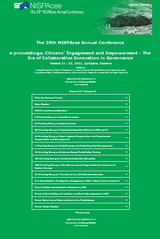Topics: Professionalizing Policy-making across the Policy Cycle
Studying and Teaching Public Administration
This was the third Summer School organized by EPAN, The European Public Administration Network, a network devoted to promote the study and teaching of Public Administration in Europe. After the successful completion of the first EPAN Summer School at Leiden University (The Netherlands): "Europeanisation, Institutional Analysis and Public Administration”, and the second summer school in Bratislava (Slovakia): "European Policy Management in Comparative Perspective", the EPAN Executive Committee decided that the coming Summer Schools should continue focusing on the double goals of strengthening the research competences in comparative public administration in an European context, and developing the pedagogical competences of the participants.
1. Purposes and objectives of the Summer School
1.1. Studying Public Administration: the policy cycle
The first purpose of the 2004 Summer School was to provide the students with a solid understanding of the dynamics, processes and principles guiding public policy formulation, decision-making, implementation and evaluation. The teachers of the Summer School are acclaimed scholars in their respective fields, with extensive research and teaching experience in Public Administration. The selected topics included among others: "Policy advice in modern policy-making", "Politico-Administrative relations in the policy process", "Implementation" and "The open method of co-ordination".
2.2. Teaching Public Administration: the case method
The second related objective of the 2004 Summer School was the improvement of pedagogical skills of the participants, particularly learning how to write and use case studies in teaching and improving lecturing techniques. Writing, lecturing and using case studies are essential elements of any teaching activity at university level, therefore they are very first aspects to take into consideration in the development of teaching skills. The idea was to invite experts in this field, to develop a larger and more systematic scheme regarding this issue, combining it with students’ own exercises.
Since a few years now an international, especially European debate has been taking place on the way the universitary education landscape should be organized, and to which criteria and expectations it should comply. One major and structural result of this debate was the decision to harmonize higher education in the countries of the European Union (cf. declaration of Bologna). Next to these harmonization efforts, there are other manifestations of the fact that the higher education field is being europeanized and internationalized. A specific example was the dissemination of teaching methods among people involved in higher education programmes (professors, lecturers, teaching assistants…). One such teaching method is the case method.
The field of public administration, public management and public policy is a fruitful domain for the case method. Cases can strengthen the insight of students in abstract principles and theories by bringing them alive. They consist of 'naked empirical evidence' e.g. about the way administrations and policy makers function and interact, policy is prepared and decided upon, policy programmes are being implemented… Cases put the students central, since it is the students who analyse the evidence in an interactive setting, self-evidently supported in this activity by the instructor.




 Price:
Price: 









